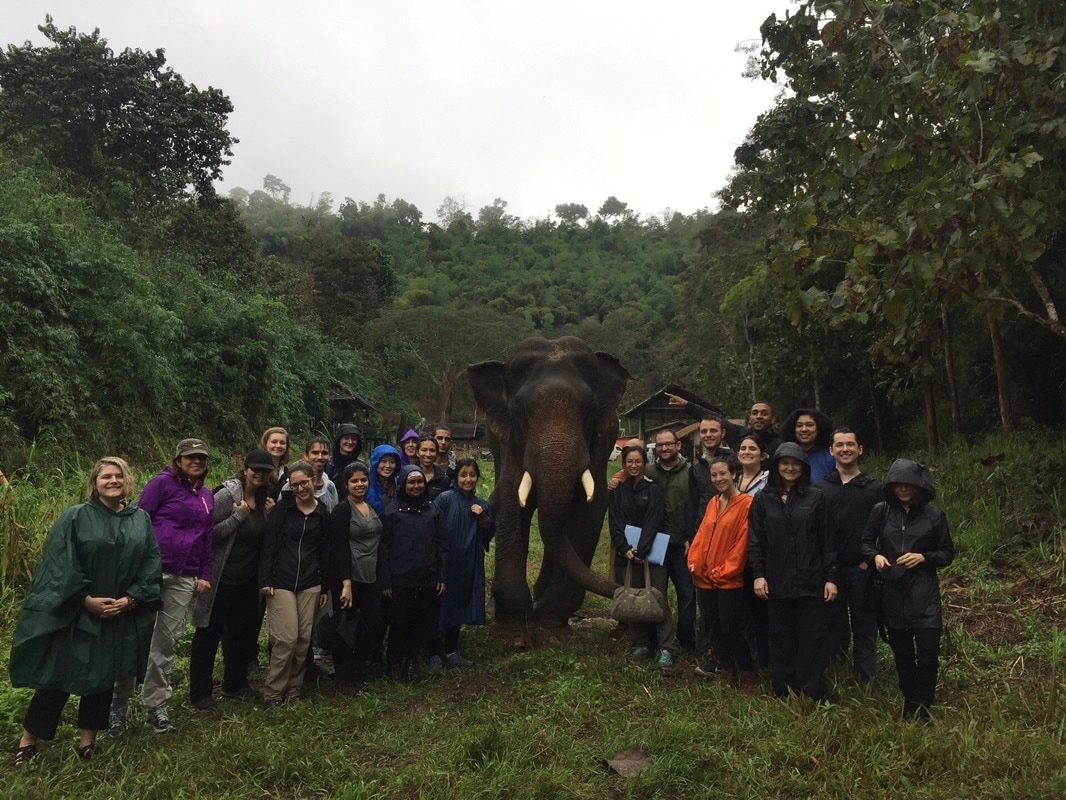MA Program
Animal Behavior & Conservation
About the
MA Program
The Animal Behavior & Conservation MA program enables students interested in animal behavior and conservation to develop and enhance their research skills and understanding of the behavior of animals, and to acquire credentials for employment in fields related to animal behavior & conservation.
Starting in Fall 2024, the ABC MA program will have two tracks: a Thesis Track and a NEW Internship Track.
MA Program
Degree Requirements

Internship Track Requirements
- 36 credits of coursework, including an internship seminar course
- One-semester internship with an approved animal-related organization
- Oral presentation and written report on the internship experience
Learn more: ABC MA Internship Track

Thesis Track Requirements
- 36 credits of coursework, including a thesis seminar course
- MA thesis: individual research supervised by a psychology department faculty member
- Oral presentation and comprehensive examination in the area of the MA thesis; conducted by the thesis committee
- Thesis must be approved by the student’s thesis committee: consisting of the faculty mentor and a second reader, and by the director of the Animal Behavior & Conservation program
Prospective applicants should contact faculty members with whom they wish to work in advance of applying.
Learn more: Faculty

MA Program Curriculum
36 credits, 12 courses
- The ABC MA program comprises six required courses and six elective courses.
- Three of the elective courses need to be ABC courses, and one of the three must meet the applied course requirement. Up to three electives can be taken with different departments (Anthropology, Geographical Technologies).
- Each course carries three credits (except one and two credit independent research courses).
- All required, and most other courses, are offered after 5:30 pm, enabling students to complete the requirements while working.
- Not all courses listed are scheduled every year and course availability may vary by semester.
Core Coursework6 courses / 18 credits
PSYCH 69000 - Independent Research in Psychology
Hours: 3
Department: Psychology
Designed to meet the research needs and interests of individual students under the direction of a faculty sponsor or internship coordinator. This may involve independent reading, tutorials, independent research projects, or participation in ongoing faculty research. Projects culminate in an APA-style research report or literature review. Note – Internship track students will conduct independent research under the guidance of the Internship coordinator and will not work in the lab of a faculty mentor. May be taken multiple times with permission of the department. May be taken in conjunction with other Independent Study courses (PSYCH 69000, PSYCH 69100, PSYCH 692000) for a total of 9 credits as long as each time the course is taken, the course content differs in topic or scope.
PSYCH 70500 - Statistical Methods in Psychology I
Hours: 2 lecture hours, 2 conference or lab hours
Department: Psychology
Covers descriptive statistics and inferential methods, including t-tests, analyses of variance, correlation, simple regression, and an introduction to multiple regression. Some assignments require the use of a statistical computer package.
PSYCH 70701 - Thesis Seminar (for Thesis MA track)
Hours: 3 hours including conference
Department: Psychology
Prerequisites: Psych 70500, Psych 70100 or 73900
Individual research conducted under the supervision of a department faculty member, whose written permission must be obtained. Limited to students working on their MA thesis.
PSYCH 71200 - Internship Seminar (for Internship MA track)
Hours: 3 hours including conference
Department: Psychology
Prerequisites: Psych 70500, Psych 70100 or 73900
Course to support internship experience; to be taken after or concurrently with internship. Internship must be approved by internship coordinator. Limited to students in the internship track of the MA program.
PSYCH 71600 - Animal Behavior I: Mechanisms of Behavior
Hours: 45 including conference
Department: Psychology
History of approaches to animal behavior; behavior development; proximate causation of behavior (motivation, neuroethology, and biorhythms); animal orientation and communication; cognitive ethology and culture.
PSYCH 71700 - Animal Behavior and Conservation in Captivity and the Wild
Hours: 3 hours including conference
Department: Psychology
Fundamental principles of animal behavior discussed in context of their applications to captive animal management (in laboratories, farms, zoos, aquariums, and shelters), animal welfare, and conservation. Programmatic approaches to animal care (e.g. enrichment and training) and animal welfare assessment tools will be described and evaluated.
PSYCH 73900 - Research Methods in Animal Behavior
Hours: 2 lecture hours, 2 conference or lab hours
Department: Psychology
Designed to develop skills required for the study of animal behavior, such as procedures for obtaining data in laboratories or in captive and natural environments; includes observational techniques, single-subject designs, issues of reliability and external validity, non-parametric statistics.
Elective Coursework6 courses / 18 credits
PSYCH 64100 - Comparative Psychology
Semester: Fall, Winter, Spring, Summer
Hours: 45 hrs including conference
Department: Psychology
Development and evolution of the behavior of various species, major theoretical issues, classic experiments, and contemporary research and theory.
PSYCH 68066 - Urban Animals
Semester: Fall, Spring
Department: Psychology
Urban Animals
PSYCH 69000 - Independent Research in Psychology; 3 Credits
Semester: Fall, Spring
Department: Psychology
Designed to meet the research needs and interests of individual students under the direction of a faculty sponsor or internship coordinator. This may involve independent reading, tutorials, independent research projects, or participation in ongoing faculty research. Projects culminate in an APA-style research report or literature review. May be taken multiple times with permission of the department. Note – Internship track students will conduct independent research under the guidance of the Internship coordinator and will not work in the lab of a faculty mentor. May be taken in conjunction with other Independent Study courses (PSYCH 69000, PSYCH 69100, PSYCH 692000) for a total of 9 credits as long as each time the course is taken, the course content differs in topic or scope.
PSYCH 69200 - Independent Research in Psychology; 2 Credits
Semester: Fall, Spring
Department: Psychology
Designed to meet the research needs and interests of individual students under the direction of a faculty sponsor or internship coordinator. This may involve independent reading, tutorials, independent research projects, or participation in ongoing faculty research. Projects culminate in an APA-style research report or literature review. May be taken multiple times with permission of the department. May be taken in conjunction with other Independent Study courses (PSYCH 69000, PSYCH 69100, PSYCH 692000) for a total of 9 credits as long as each time the course is taken, the course content differs in topic or scope.
PSYCH 69100 - Independent Research in Psychology; 1 Credits
Semester: Fall, Spring
Department: Psychology
Designed to meet the research needs and interests of individual students under the direction of a faculty sponsor or internship coordinator. This may involve independent reading, tutorials, independent research projects, or participation in ongoing faculty research. Projects culminate in an APA-style research report or literature review. May be taken multiple times with permission of the department. May be taken in conjunction with other Independent Study courses (PSYCH 69000, PSYCH 69100, PSYCH 692000) for a total of 9 credits as long as each time the course is taken, the course content differs in topic or scope.
PSYCH 70702 - Thesis Seminar II
Semester: Fall, Spring
Department: Psychology
Prerequisite: PSYCH 707.01
Additional semester of individual research under the supervision of a department faculty member. A formally approved Thesis Proposal and written approval from the faculty sponsor is required. Limited to students working in their MA thesis.
PSYCH 71751 - Field Study in Animal Behavior and Conservation
Semester: Fall (only)
Hours: 45 including conference
Department: Psychology
Observation and study of the behavior of animals in their natural environment and application of techniques of observation and data analysis. *Fulfills applied course requirement.
PSYCH 71800 - Ethology (Animal Behavior II – Behavioral Ecology)
Hours: 45 including conference
Department: Psychology
Examines behavioral genetics, which covers the importance of single-gene effects, polygenic behavioral traits, and the utility of the concept of heritability; behavioral evolution, which covers the methods of elucidating the phylogeny of behavior when fossil evidence is not available; behavioral ecology, which focuses on mating systems, territorial behavior, feeding strategies, antipredatory behavior, and sociobiology.
PSYCH 75048 - Behavioral Ecology: Applications to Wildlife Conservation in our Changing World
Semester: Fall, Spring
Department: Psychology
Behavioral Ecology: Applications to Wildlife Conservation in our Changing World. *Fulfills applied course requirement.
PSYCH 75096 - Human Culture & Animal Behavior Perspectives in Conservation and Human-Wildlife Conflict
Semester: Fall, Spring
Hours:
Department: Psychology
This course explores the conflict between humans and wild non-human animals, particularly in relation to endangered species. Key issues include human population growth, habitat destruction, and cultural traditions conflicting with conservation efforts. Through case studies, students examine how human culture, population dynamics, animal behavior, and conservation intersect, leading to conflicts.
PSYCH 75400 - Applied Animal Welfare & Behavior
Semester: Fall, Spring
Hours:
Department: Psychology
Fundamental principles of animal behavior discussed in context of their applications to captive animal management (in laboratories, farms, zoos, aquariums, and shelters), animal welfare, and conservation. Programmatic approaches to animal care (e.g. enrichment and training) and animal welfare assessment tools will be described and evaluated. *Fulfills applied course requirement.
PSYCH 75700 - Animal Thinking and Communication
Semester: Fall (only)
Hours:
Department: Psychology
Prerequisite: PSYCH 71700 or permission of instructor or of Animal Behavior and Conservation Coordinator
This course focuses on animal cognition and communication from the perspectives of communication theory, animal behavior, cognitive ethology and comparative cognition. Research on chimpanzees, dolphins, elephants, parrots and other animals will be covered.
PSYCH 75800 - Conservation Biology Psychology
Semester: Fall (only)
Hours: 30 hrs lecture, 30 hrs lab
Department: Psychology
This course provides an understanding of biodiversity, human impacts on biodiversity, the theory and practice of maintaining biodiversity in a developing world, and the social psychology of motivating action to protect nature. *Fulfills applied course requirement.
Anthropology Electives
ANTHP 79164 - Primates Evolution, Genetics & Behavior
Semester: Fall, Spring
Hours: 3 lecture hours
Department: Anthropology
Covers descriptive statistics and inferential methods, including t-tests, analyses of variance, correlation, simple regression, and an introduction to multiple regression. Some assignments require the use of a statistical computer package.
ANTHP 79153 - Primate Conservation Biology
Semester: Fall, Spring
Hours: 3 lecture hours
Department: Anthropology
This course offers an overview of biodiversity conservation with a focus on primates. It explores the science and ethical considerations surrounding the conservation of primate species, including threats to their survival and conservation strategies. .
ANTHP 79400 - Primate Ecology and Behavior
Semester: Fall, Winter, Spring, Summer
Hours: 2 lecture hours, 2 conference or lab hours
Department: Anthropology
Covers descriptive statistics and inferential methods, including t-tests, analyses of variance, correlation, simple regression, and an introduction to multiple regression. Some assignments require the use of a statistical computer package.
Geographical Technology Electives
GTECH 70900 - Introduction to Geographic Information Systems
Semester: Fall, Winter, Spring, Summer
Hours: 2 lecture hours, 2 conference or lab hours
Department: Geography and Environmental Science
Thorough introduction to geographic information systems (GIS) using multiple desktop and web-based GIS with an emphasis on spatial data handling and project management. MS GeoInformatics students are recommended to take GTECH 71000 at the same time as this course.
GTECH 71000 - Concepts & Theories in GeoInformatics
Semester: Fall, Winter, Spring, Summer
Hours: 2 lecture hours, 2 conference or lab hours
Department: Geography and Environmental Science
Theoretical and conceptual foundations of GeoInformatics and Geographic Information Science. For MS GeoInformatics (MGEOi) students, GTECH 70900 is recommended to be taken at the same time as this course.
GTECH 73200 - Advanced Geoinformatics
Semester: Fall, Winter, Spring, Summer
Hours: 2 lecture hours, 2 conference or lab hours
Department: Geography and Environmental Science
Expansion of GTECH 70900 and 71000 concentrating on advanced concepts in GeoInformatics, including data models, algorithms, GIS analysis and scripting.
Possible Timeline for Degree Completion
The sequence of course offerings enables students taking nine credits per semester to graduate in two years.
PSYCH 70500 – Statistical Methods in Psychology
PSYCH 71700 – ABC in Captivity and the Wild
PSYCH XXXXX – ABC Elective
PSYCH 73900 – Research Methods in ABC
PSYCH 69000 – Independent Research
PSYCH XXXXX – ABC Elective
PSYCH 71600 – Animal Behavior I: Mechanisms of Behavior
XXXXX XXXXX – ABC | GTECH | ANTH Elective
XXXXX XXXXX – ABC | GTECH | ANTH Elective
MA Program Admissions Criteria
Students can apply to either the MA Internship Track or the MA Thesis Track and they need to specify which program they are applying to in the first sentence of their personal statement.
Applicants are ranked according to their undergraduate grade point average, letters of recommendation, and personal statement, as well as prior course work and experience relevant to animal behavior and conservation.
There is no foreign-language requirement for the MA in psychology.
Application Checklist
You must meet the following minimum requirements in order to be considered for admission. Meeting these minimum requirements does not guarantee acceptance to the program.
- A bachelor’s degree from a regionally accredited institution comparable in standard and content to a bachelor’s degree from Hunter College.
- Twelve undergraduate credits in psychology, including courses in statistics and experimental psychology, are generally required; however, students lacking this but with a high undergraduate GPA and general GRE scores may be admitted without a strong background in psychology. Such students may be required to take preparatory statistics and experimental courses.
- Minimum undergraduate grade point average of 3.0.
-
A statement of purpose of approximately 500 words describing your objectives in undertaking graduate study. In reviewing applications, considerable importance is placed on the applicant’s interest in and commitment to advanced study and professional development.
Personal Statement Directions
When crafting your statements, please note in the first line whether you are applying to the research track or the internship track; you will only be considered for one or the other during the application review process.
Research Track: If you are applying for the research track, please acknowledge whether you have already contacted a full-time faculty member in the ABC program about working with them in their lab (this is highly recommended, as we will discuss potential fit with faculty during the admissions process). Please also make sure to write in your statement about your previous research experience and your future research interests, including potential questions you might ask or hypotheses you might test for your thesis. For faculty currently accepting students into the thesis track, please see the faculty page.
Internship Track: If you are applying for the internship track, please make sure to address your prior experiences relevant to the ABC program, and your career goals following the completion of the Master’s degree in your statement.
- Two letters of recommendation from appropriate academic or professional sources.
- GREs are not required for this program.
- Applicants whose native language is not English and who have taken all or part of their undergraduate education in a country where English is not the native language are required to submit scores on the TOEFL/IELTS. The following minimum scores must be obtained:
- TOEFL iBT: 80/ Paper Based Test: 550/ Computer Administered Test: 213
- IELTS; 6.5 Overall Band Score
Apply Now
Hunter College Online Application
To access an existing application, please visit the applicant login portal.
Applications are through Hunter College Graduate Admissions. Before applying, review the Graduate Admissions links below.
Hunter College Graduate Admissions
Hunter College Graduate Admissions ABC MA Program
Application Deadline
February 1st, 2025
Contact
Nicolina Steinhoff, Graduate Advisor
gr_psych@hunter.cuny.edu
212-772-5550


